
Fibber McGee and Molly (1935–1959) was a longtime highly popular husband-and-wife team radio comedy program.

Arthur Quirk Bryan was an American actor and radio personality. He is best remembered for his longtime recurring role as well-spoken, wisecracking Dr. Gamble on the radio comedy Fibber McGee and Molly and for creating the voice of the Warner Brothers cartoon character Elmer Fudd.
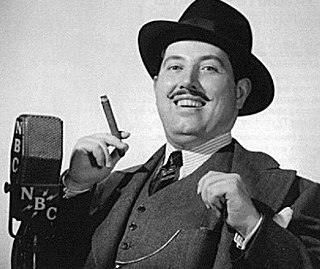
The Great Gildersleeve is a radio situation comedy broadcast in the United States from August 31, 1941 to 1958. Initially written by Leonard Lewis Levinson, it was one of broadcast history's earliest spin-off programs. The series was built around Throckmorton P. Gildersleeve, a regular character from the radio situation comedy Fibber McGee and Molly. The character was introduced in the October 3, 1939, episode of that series. Actor Harold Peary had played a similarly named character, Dr. Gildersleeve, on earlier episodes. The Great Gildersleeve enjoyed its greatest popularity in the 1940s. Peary played the character during its transition from the parent show into the spin-off and later in four feature films released at the height of the show's popularity.

Walter Tetley was an American actor specializing in child impersonation during radio's classic era, with regular roles as Leroy Forrester on The Great Gildersleeve and Julius Abbruzzio on The Phil Harris-Alice Faye Show, as well as continuing as a voice-over artist in animated cartoons, commercials, and spoken-word record albums. He is perhaps best known as the voice of Sherman in the Jay Ward-Bill Scott Mr. Peabody TV cartoons.

Lillian Randolph was an American actress and singer, a veteran of radio, film, and television. She worked in entertainment from the 1930s until shortly before her death. She appeared in hundreds of radio shows, motion pictures, short subjects, and television shows.
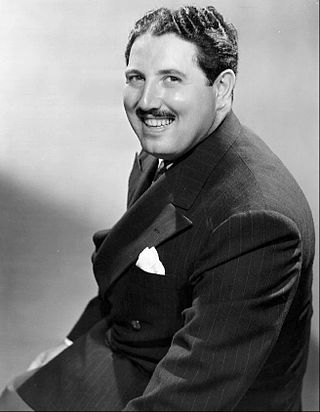
Harold "Hal" Peary was an American actor, comedian and singer in radio, films, television, and animation. His most memorable role is as Throckmorton P. Gildersleeve, which began as a supporting character on radio's Fibber McGee and Molly in 1938.

Marion Suplee known professionally as Marion Martin was an American film and stage actress.

Willard Lewis Waterman was an American character actor in films, TV and on radio, remembered best for replacing Harold Peary as the title character of The Great Gildersleeve at the height of that show's popularity.
In media, a spin-off is a radio program, television program, film, video game or any narrative work, derived from already existing works that focus on more details and different aspects from the original work.

The Ape Man is a 1943 American horror film directed by William Beaudine. The film is based on "They Creep in the Dark" by Karl Brown, which was published in The Saturday Evening Post. It stars Bela Lugosi as Dr. James Brewster who is aided by his colleague Dr. Randall. The doctor managed to transform himself into a ape man hybrid and desperately seeks a cure. Brewster believes that only the injection of human spinal fluid will prove effective as a cure. As Randall refuses to help him, Brewster and his captive gorilla seek involuntary donors.
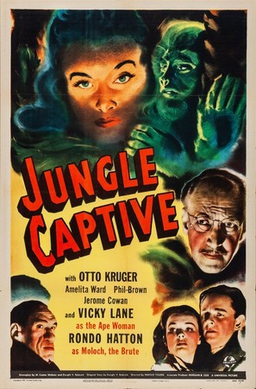
The Jungle Captive is a 1945 horror film directed by Harold Young. The film is a sequel to Jungle Woman (1944), which had been preceded by Captive Wild Woman and is the final film in the series. Jungle Captive features Otto Kruger, Amelita Ward, and Rondo Hatton. Vicky Lane plays Paula Dupree the Ape Woman.

Look Who's Laughing is a 1941 film from RKO Radio Pictures. The film is built around a number of radio stars from the Golden Age of Radio and centers around radio personality Jim Jordan as Fibber McGee from the comic duo, Fibber McGee and Molly, who plans to build an aircraft factory in a small town. Look Who's Laughing was followed by Here We Go Again (1942), with many of the radio stars reprising their performances.

Here We Go Again is a 1942 American film, a sequel to Look Who's Laughing. With RKO in financial trouble, with the success of the earlier zany comedy starring a bevy of radio stars, Here We Go Again put Fibber McGee and Molly in a search for where to celebrate the couple's 20th anniversary. They want to throw a big party but when everyone declines their invitation, they decide to go on a second honeymoon instead.
Gildersleeve on Broadway is a 1943 American film starring Harold Peary as his radio character The Great Gildersleeve. It is the third of four Gildersleeve features, others were The Great Gildersleeve (1942), Gildersleeve's Bad Day (1943), Gildersleeve's Ghost (1944).

Margie Stewart was the official United States Army poster girl during World War II. She appeared on twelve posters, of which a total of 94 million copies were distributed.
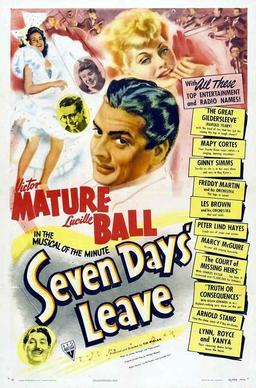
Seven Days' Leave is a 1942 musical comedy about a soldier who has seven days to marry an heiress in order to inherit $100,000.
The Great Gildersleeve is a 1942 American comedy film directed by Gordon Douglas. Based on the popular NBC radio series The Great Gildersleeve created by Leonard L. Levinson, which ran from 1941 to 1950, this is the first of four films in the Gildersleeve series produced and distributed by RKO Radio Pictures. The screenplay was written by Jack Townley and Julien Josephson, and the film stars Harold Peary and Jane Darwell. Other films in the series are Gildersleeve's Bad Day (1943), Gildersleeve on Broadway (1943) and Gildersleeve's Ghost (1944).
Gildersleeve's Bad Day is a 1943 American comedy film directed by Gordon Douglas from a screenplay by Jack Townley. The picture was the second in the Gildersleeve's series produced and distributed by RKO Radio Pictures, based on the popular NBC radio program, The Great Gildersleeve, created by Leonard L. Levinson, and was released on June 10, 1943. The film stars Harold Peary, Jane Darwell and Nancy Gates.
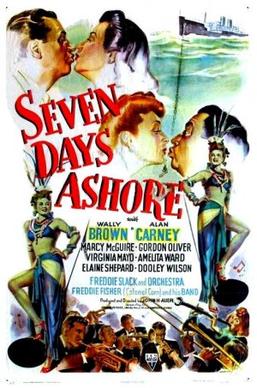
Seven Days Ashore is a 1944 American comedy film directed by John H. Auer and written by Edward Verdier, Irving Phillips and Lawrence Kimble. The film stars Wally Brown, Alan Carney, Marcy McGuire, Virginia Mayo, Elaine Shepard, Gordon Oliver, Amelita Ward and Dooley Wilson. The film was released on April 25, 1944, by RKO Pictures.
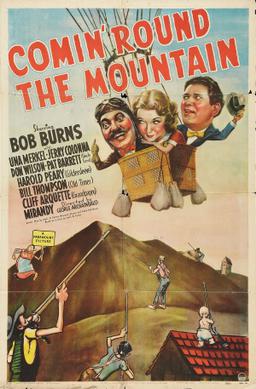
Comin' Round the Mountain is a 1940 American comedy film directed by George Archainbaud and written by Lewis R. Foster, Maxwell Shane and Duke Atteberry. The film stars Bob Burns, Una Merkel, Jerry Colonna, Don Wilson, Pat Barrett, Harold Peary and Bill Thompson. The film was released on August 16, 1940, by Paramount Pictures.
















